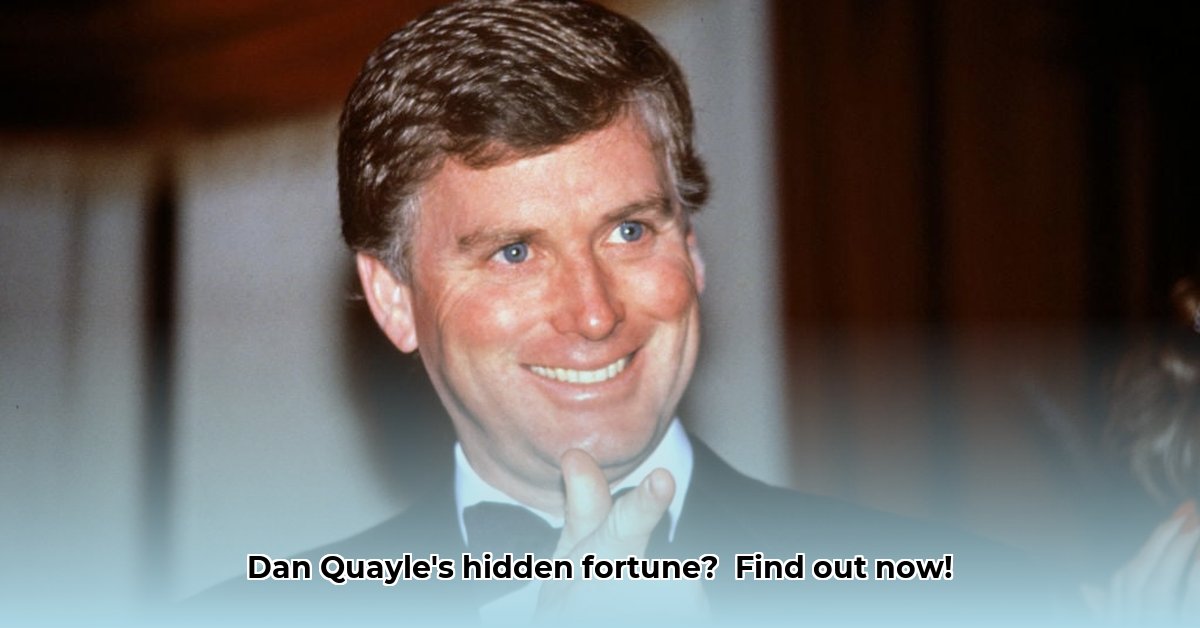
Dan Quayle's Post-Vice Presidency Finances: A Closer Look
What is Dan Quayle's net worth? This question, while seemingly simple, reveals a complex picture of post-political wealth. Estimating the financial standing of a former public figure like Quayle presents unique challenges, as complete financial disclosures are not publicly mandated. However, by examining available data and comparing it to other former Vice Presidents, we can piece together a clearer, albeit still somewhat imprecise, understanding of his financial journey.
From Washington to Wall Street: Navigating Life After the Vice Presidency
Leaving the political arena doesn't always mean financial ruin. Many former Vice Presidents leverage their experience and networks to build considerable wealth. Common avenues include lucrative book deals, high-fee speaking engagements, and positions on corporate boards. However, the actual earnings vary significantly depending on individual circumstances and the choices made after leaving office. Did Dan Quayle successfully navigate this transition, securing a substantial financial future? Let's delve deeper.
Unpacking the Estimates: Understanding the Range
Estimates of Dan Quayle's net worth vary widely, ranging from $3 million to $6 million. This considerable discrepancy stems from the inherent difficulty in obtaining precise financial information about private individuals. A large portion of his income likely originates from book royalties and his roles on various corporate boards and advisory committees. Yet, the lack of complete public financial disclosures makes it difficult to arrive at an exact figure.
A Comparative Analysis: Quayle's Wealth in Context
To understand Quayle's financial success, a comparative approach is necessary. Comparing his estimated net worth to other former Vice Presidents reveals interesting patterns. For instance, Joe Biden, according to reports [1] has amassed a significantly larger fortune through book deals and speaking engagements. In stark contrast, Dick Cheney's reported net worth of approximately $100 million [2] is largely attributed to his business dealings with Halliburton and his extensive speaking engagements. This wide range highlights the varied paths towards post-political financial success and the many factors influencing these outcomes.
Key Factors Shaping Post-Political Finances
Several factors influence a former Vice President's financial trajectory. Public perception during their time in office plays a significant role, influencing the demand for books and speaking appearances. The overall economic climate also impacts opportunities and investment returns. Finally, the individual's ability to strategically build a personal brand and seize business opportunities is crucial. While some aggressively cultivate their post-political image, others prioritize philanthropic ventures or public service roles. Analyzing these factors helps us interpret the available data on Dan Quayle’s post-political wealth.
The Crucial Need for Transparency
The inconsistencies in reported net worth among former Vice Presidents underscore the necessity for greater transparency in financial reporting. More accessible and accurate information would allow for more robust analysis and increase public trust. Improved disclosure requirements could reduce the potential for conflicts of interest and ensure greater accountability.
Calculating Net Worth: A Complex Undertaking
Calculating the net worth of a former Vice President is a complex undertaking. Unlike publicly traded companies, there's no legal obligation for comprehensive financial disclosure. This lack of transparency makes precise estimations challenging. The process involves analyzing various income streams, including book royalties, speaking fees, investment returns, and asset values (real estate, etc.). The absence of readily available, complete financial information necessitates a more nuanced approach to evaluating such figures.
Dan Quayle's Post-Political Financial Strategy: A Case Study
Dan Quayle's post-political endeavors suggest a strategic approach to wealth building. He leveraged his experience and connections to secure book deals, high-profile speaking engagements and likely advantageous investment opportunities. However, the lack of public information prevents a detailed breakdown of his investment portfolio. Did his political background offer him an advantage in accessing these opportunities? While there is circumstantial evidence to suggest it, definitive conclusions remain elusive.
Comparing Financial Trajectories: A Need for More Data
Comparing Quayle's financial success to his peers requires a more comprehensive comparative analysis. A robust study, using consistent methodologies and accounting for variables such as time spent in office and economic conditions, would provide crucial context. This comparative research would be instrumental in evaluating the extent of his financial achievements.
Lessons Learned and Future Directions
Quayle's financial journey highlights the significance of financial transparency in public life and its impact on public trust. This lack of data in comparison to other former Vice Presidents underscores the need for more comprehensive disclosures. Improving transparency would not only enhance academic research but contribute to greater institutional accountability and public confidence.
[1] (Insert reliable source for Joe Biden's net worth) [2] (Insert reliable source for Dick Cheney's net worth)